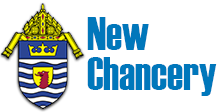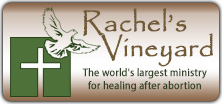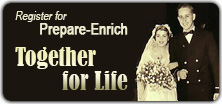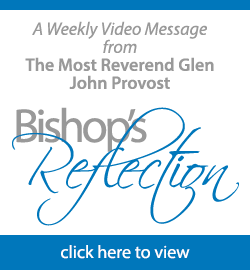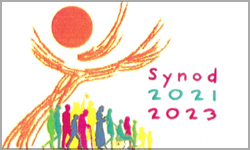FROM THE DIOCESE OF LAKE CHARLES
OFFICE OF THE VICAR GENERAL
6 January 2022
My dear brothers and sisters in Christ,
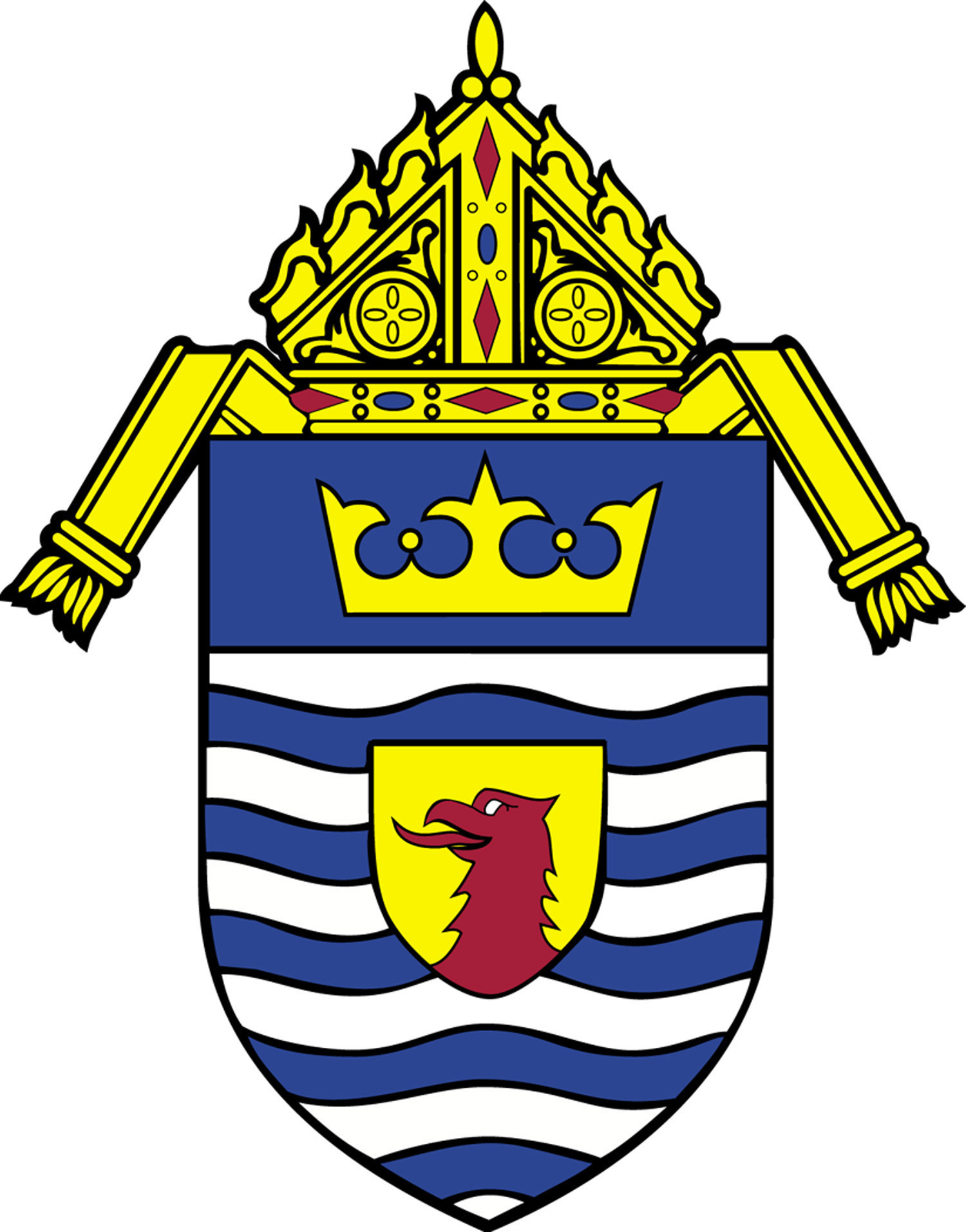 I pray that this Christmas Season has been a blessing for you thus far. Bishop Provost gave me the task of chairing the work in the diocese regarding the Synod. The Holy Father has called for each diocese to participate. I humbly seek your assistance as we journey together to prepare the document to be sent to the Vatican for their review in August of this year.
I pray that this Christmas Season has been a blessing for you thus far. Bishop Provost gave me the task of chairing the work in the diocese regarding the Synod. The Holy Father has called for each diocese to participate. I humbly seek your assistance as we journey together to prepare the document to be sent to the Vatican for their review in August of this year.
The theme of the Synod is "For a Synodal Church: Communion, Participation, and Mission." The three dimensions of the theme are communion, participation, and mission. These three dimensions are profoundly interrelated. They are the vital pillars of a Synodal Church. There is no hierarchy between them. Rather, each one enriches and orients the other two. There is a dynamic relationship between the three that must be articulated with all three in mind.
Communion: By his gracious will. God gathers us together as diverse peoples of one faith, through the covenant that he offers to his people. The communion we share finds its deepest roots in the love and unity of the Trinity. It is Christ who reconciles us to the Father and unites us with each other in the Holy Spirit. Together, we are inspired by listening to the Word of God, through the living Tradition of the Church, and grounded in the sensus fidei that we share. We all have a role to play in discerning and living out God's call for his people.
Participation: A call for involvement of all who belong to the People of God — laity, consecrated and ordained - to engage in the exercise of deep and respectful listening to one another. This listening creates space for us to hear the Holy Spirit together, and guides our aspirations for the Church of the Third Millennium. Participation is based on the fact that all the faithful are qualified and are called to serve one another through the gifts they have each received from the Holy Spirit. In a synodal Church the whole community, in the free and rich diversity of its members, is called together to pray, listen, analyze, dialogue, discern, and offer advice on making pastoral decisions which correspond as closely as possible to God's will (ICT, Syn., 67-68). Genuine efforts must be made to ensure the inclusion of those at the margins or who feel excluded.
Mission: The Church exists to evangelize. We can never be centered on ourselves. Our mission is to witness to the love of God in the midst of the whole human family. This Synodal Process has a deeply missionary dimension to it. It is intended to enable the Church to better witness to the Gospel, especially with those who live on the spiritual, social, economic, political, geographical, and existential peripheries of our world. In this way, synodality is a path by which the Church can more fruitfully fulfil her mission of evangelization in the world, as a leaven at the service of the coming of God's kingdom.
As I reflected on this, the first thing that came into my mind was, "Where charity and love prevail, there God is ever found; brought here together by Christ's love, by love are we thus bound" (9th Century Ubi Caritas). The People of God in this diocese have shown a resilient spirit rooted in their Catholic faith to show charity and love to all by serving God and neighbor over these past decades and most recently through the tough times of the Pandemic, hurricanes, winter storm, flooding, tornadoes, economic crisis, and personal issues.
We have learned through emulating the love and compassion of Jesus Christ to all, we are being asked to dialogue in the parish settings of organizations, councils, leadership as well as religious order settings to share a vision on how we can be more of Christ to all.
I ask that in the months of January and February that each organization, ministry, and entity of the parish/religious order/school have discussions of the past history, present realities, and future dreams of the Catholic Church that people may share.
This Synod poses the following fundamental question: A synodal Church, in announcing the Gospel, ''journeys together." How is this "journeying together" happening today in your local Church? What steps does the Spirit invite us to take in order to grow in our ''journeying together?"
To help people explore this fundamental question more fully, the following theses highlight significant aspects of"lived synodality" (PD, 30). In responding to these questions, it is helpful to remember that ''journeying together" occurs in two deeply interconnected ways. First, we journey together with one another as the People of God. Next, we journey together as the People of God with the entire human family. These two perspectives enrich one another and are helpful for our common discernment towards deeper communion and more fruitful mission.
The questions accompanying each of the following ten themes can be used as a starting point or helpful guideline. Your conversation and dialogue do not need to be limited to the following questions:
1. COMPANIONS ON THE JOURNEY
In the Church and in society we are side by side on the same road. In our local Church, who are those who "walk together"? Who are those who seem further apart? How are we called to grow as companions? What groups or individuals are left on the margins?
2. LISTENING
Listening is the first step, but it requires an open mind and heart, without prejudice. How is God speaking to us through voices we sometimes ignore? How are the laity listened to, especially women and young people? What facilitates or inhibits our listening? How well do we listen to those on the peripheries? How is the contribution of consecrated men and women integrated? What are some limitations in our ability to listen, especially to those who have different views than our own? What space is there for the voice of minorities, especially people who experience poverty, marginalization, or social exclusion?
3. SPEAKING OUT
All are invited to speak with courage and parrhesia, that is in freedom, truth, and charity. What enables or hinders speaking up courageously, candidly, and responsibly in our local Church and in society? When and how do we manage to say what is important to us? How does the relationship with the local media work (not only Catholic media)? Who speaks on behalf of the Christian community, and how are they chosen?
4. CELEBRATION
"Walking together" is only possible ifit is based on communal listening to the Word and the celebration of the Eucharist. How do prayer and liturgical celebrations actually inspire and guide our common life and mission in our community? How do they inspire the most important decisions? How do we promote the active participation of all the faithful in the liturgy? What space is given to participating in the ministries of lector and acolyte?
5. SHARING RESPONSIBILITY FOR OUR COMMON MISSION
Synodality is at the service of the mission of the Church, in which all members are called to participate. Since we are all missionary disciples, how is every baptized person called to participate in the mission of the Church? What hinders the baptized from being active in mission? What areas of mission are we neglecting? How does the community support its members who serve society in various ways (social and political involvement, scientific research, education, promoting social justice, protecting human rights, caring for the environment, etc.)? How does the Church help these members to live out their service to society in a missionary way? How is discernment about missionary choices made and by whom?
6. DIALOGUE IN CHURCH AND SOCIETY
Dialogue requires perseverance and patience, but it also enables mutual understanding. To what extent do diverse peoples in our community come together for dialogue? What are the places and means of dialogue within our local Church? How do we promote collaboration with neighboring dioceses, religious communities in the area, lay associations and movements, etc.? How are divergences of vision, or conflicts and difficulties addressed? What particular issues in the Church and society do we need to pay more attention to? What experiences of dialogue and collaboration do we have with believers of other religions and with those who have no religious affiliation? How does the Church dialogue with and learn from other sectors of society: the spheres of politics, economics, culture, civil society, and people who live in poverty?
7. ECUMENISM
The dialogue between Christians of different confessions, united by one baptism, has a special place in the synodal journey. What relationships does our Church community have with members of other Christian traditions and denominations? What do we share and how do we journey together? What fruits have we drawn from walking together? What are the difficulties? How can we take the next step in walking forward with each other
8. AUTHORITY AND PARTICIPATION
A synodal Church is a participatory and co-responsible Church. How does our Church community identify the goals to be pursued, the way to reach them, and the steps to be taken? How is authority or governance exercised within our local Church? How are teamwork and co-responsibility put into practice? How are evaluations conducted and by whom? How are lay ministries and the responsibility of lay people promoted? Have we had fruitful experiences of synodality on a local level? How do synodal bodies function at the level of the local Church (Pastoral Councils in parishes and dioceses, Presbyteral Council, etc.)? How can we foster a more synodal approach in our participation and leadership?
9. DISCERNING AND DECIDING
In a synodal style we make decisions through discernment of what the Holy Spirit is saying through our whole community. What methods and processes do we use in decisionmaking? How can they be improved? How do we promote participation in decisionmaking within hierarchical structures? Do our decision-making methods help us to listen to the whole People of God? What is the relationship between consultation and decisionmaking, and how do we put these into practice? What tools and procedures do we use to promote transparency and accountability? How can we grow in communal spiritual discernment?
10. FORMING OURSELVES IN SYNODALITY
Synodality entails receptivity to change, formation, and on-going learning. How does our church community form people to be more capable of "walking together," listening to one another, participating in mission, and engaging in dialogue? What formation is offered to foster discernment and the exercise of authority in a synodal way?
In the discussion settings, it may be suggested to have each organization as well as parishioners reflect on the above topics and write their reflections and bring them to a meeting in January and February in the church parish so that everyone may be heard. From these gatherings, I ask that each parish send a maximum of ten representatives to a gathering on Saturday, March 26, at Our Lady Queen of Heaven Parish in Lake Charles beginning at 8:00 AM with Mass in the Church, and at 9:30 AM to 12:30 PM a diocesan-wide discussion, hearing from each parish, religious order, and school will take place in the Family Life Center gym. The representatives can hear, vision, and offer the hopes and dreams for the diocese.
In April, the committees assisting me with the draft document will be putting all of this information together. It will be printed onto the diocesan website for the month of May for all to review in the diocese and everyone living in the diocesan territory may write to offer more thoughts. In the month of June, the committee will meet to make its final draft and then present it to the Bishop. It will then be sent to the Vatican in its process.
Your help is greatly appreciated in this matter. If you have any questions, please contact me at This email address is being protected from spambots. You need JavaScript enabled to view it.. I remain
Sincerely in Christ,
Reverend Monsignor Daniel A. Torres
Vicar General for Pastoral Services
Download The Letter Here: 2022-01-06_Diocese-Synod-Input-Letter.pdf (319 KB, 2022-01-06 14:34)

